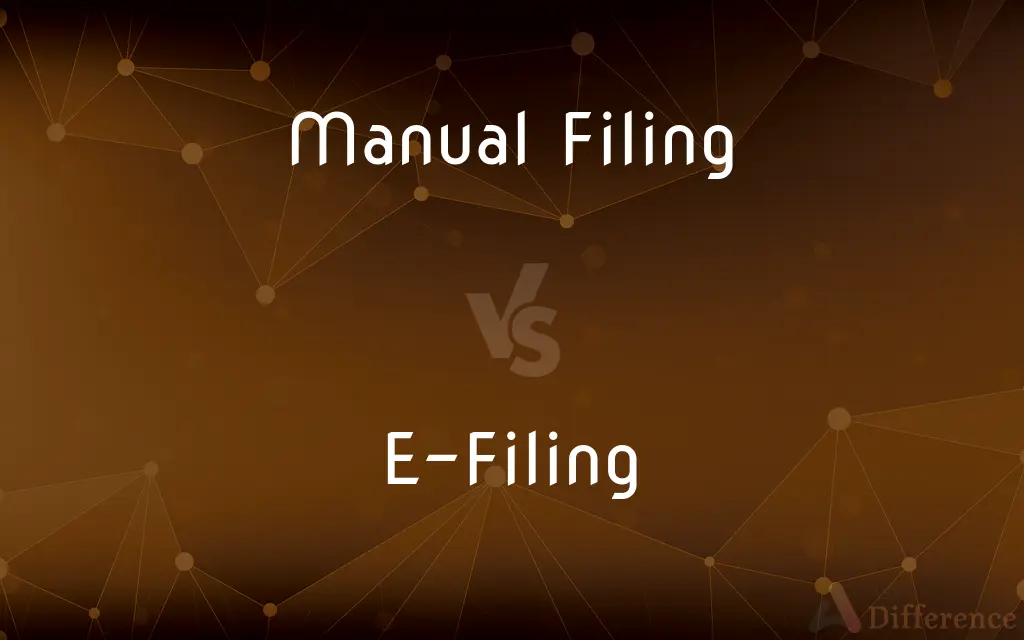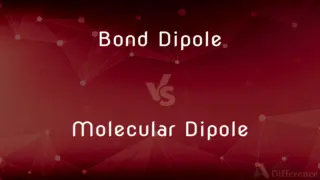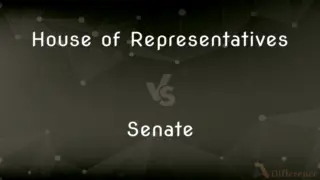Manual Filing vs. E-Filing — What's the Difference?
By Tayyaba Rehman — Published on October 31, 2023
Manual Filing involves physical documentation using paper and folders, while E-Filing uses electronic systems to store and manage documents.

Difference Between Manual Filing and E-Filing
Table of Contents
ADVERTISEMENT
Key Differences
Manual Filing encompasses the traditional method of organizing and storing documents using tangible tools like paper, folders, and cabinets. E-Filing, contrastingly, taps into the power of digital platforms to categorize and preserve records.
The practice of Manual Filing often requires physical space, given the need for storage units like file cabinets and racks. E-Filing eliminates this spatial constraint by digitizing documents and hosting them on servers or cloud platforms.
In Manual Filing, access to documents might necessitate a physical search through folders and may be time-consuming. With E-Filing, retrieval is expedited with search functions, enabling instant access to specific files.
While Manual Filing has the tactile advantage and can function without technological tools, it is susceptible to wear and tear, misplacement, or damage. E-Filing, in its electronic domain, offers benefits like backup options and encryption, although it relies heavily on technological infrastructure.
The decision to opt for Manual Filing or E-Filing often hinges on factors like volume of documents, accessibility needs, and infrastructure availability. While both have their merits, E-Filing is increasingly becoming the norm due to its efficiency and eco-friendliness.
ADVERTISEMENT
Comparison Chart
Nature
Physical process.
Digital process.
Storage
Paper, folders, and cabinets.
Servers, cloud platforms, and electronic databases.
Accessibility
May require physical search.
Quick retrieval with search functions.
Vulnerabilities
Susceptible to physical damage.
Dependent on technology, but offers backup and encryption.
Infrastructure Needs
Requires physical space and storage units.
Needs technological tools, internet, and electronic devices.
Compare with Definitions
Manual Filing
Storage of documents without digital intervention.
Manual Filing can sometimes be more tactile and immediate.
E-Filing
Electronic method to organize and categorize information.
Companies now favor E-Filing due to its efficiency.
Manual Filing
The traditional method of storing documents physically.
The office still uses Manual Filing for certain sensitive contracts.
E-Filing
Digital alternative to traditional paper-based filing.
Transitioning to E-Filing reduced the company's paper consumption.
Manual Filing
System of categorizing records on paper.
Manual Filing systems often require a keen sense of organization.
E-Filing
Storing and managing documents electronically.
He started E-Filing his taxes to expedite the process.
Manual Filing
Relies on physical space for document preservation.
The basement was filled with cabinets used for Manual Filing.
E-Filing
Using technology to manage and store documents.
With E-Filing, she could access her documents from anywhere.
Manual Filing
Organizing records using tangible tools like folders.
She preferred Manual Filing for her personal documents at home.
E-Filing
Digital submission or storage of records.
E-Filing has made document retrieval significantly faster.
E-Filing
The use of computer technology to file documents (in a legal case, a patent application, etc.).
Common Curiosities
What is the primary difference between Manual Filing and E-Filing?
Manual Filing uses physical documentation, while E-Filing uses electronic systems.
Can E-Filing systems be accessed remotely?
Yes, most E-Filing systems can be accessed remotely, given the appropriate permissions and internet access.
What are the vulnerabilities of Manual Filing?
Manual Filing can be prone to physical damage, misplacement, wear and tear, and may require more space.
Is Manual Filing becoming obsolete with the rise of E-Filing?
While E-Filing is becoming more popular due to its convenience, Manual Filing is still used in specific contexts.
Do both systems require an organized structure?
Yes, both Manual Filing and E-Filing benefit from an organized system for efficient retrieval.
Is E-Filing more eco-friendly than Manual Filing?
Generally, yes. E-Filing reduces the need for paper, printing, and physical storage.
Can I convert my Manual Filing system to an E-Filing system?
Yes, through the process of digitization, Manual Filing documents can be scanned and converted into E-Filing.
What happens if the technology for E-Filing fails?
Many E-Filing systems have backup solutions and redundancies to prevent data loss.
How secure is E-Filing?
E-Filing can be very secure, especially with encryption and secure servers, but it's essential to have robust cybersecurity measures.
Can I integrate other digital tools with E-Filing systems?
Yes, many E-Filing systems offer integrations with other software and digital tools.
Do I need special software for E-Filing?
Typically, yes. E-Filing often requires specific software or platforms for document management.
Is E-Filing faster than Manual Filing?
Generally, E-Filing offers quicker document retrieval and submission compared to Manual Filing.
Which is more cost-effective: Manual Filing or E-Filing?
It depends. While E-Filing might reduce costs in the long run, there's an initial investment in tech and software.
Is Manual Filing completely free from technology?
While it doesn't rely on digital storage, modern Manual Filing may still use tech tools, like label printers.
Why might an organization still choose Manual Filing?
They might prefer tactile access, deem it suitable for specific documents, or find it cost-effective in their context.
Share Your Discovery

Previous Comparison
Bond Dipole vs. Molecular Dipole
Next Comparison
House of Representatives vs. SenateAuthor Spotlight
Written by
Tayyaba RehmanTayyaba Rehman is a distinguished writer, currently serving as a primary contributor to askdifference.com. As a researcher in semantics and etymology, Tayyaba's passion for the complexity of languages and their distinctions has found a perfect home on the platform. Tayyaba delves into the intricacies of language, distinguishing between commonly confused words and phrases, thereby providing clarity for readers worldwide.












































